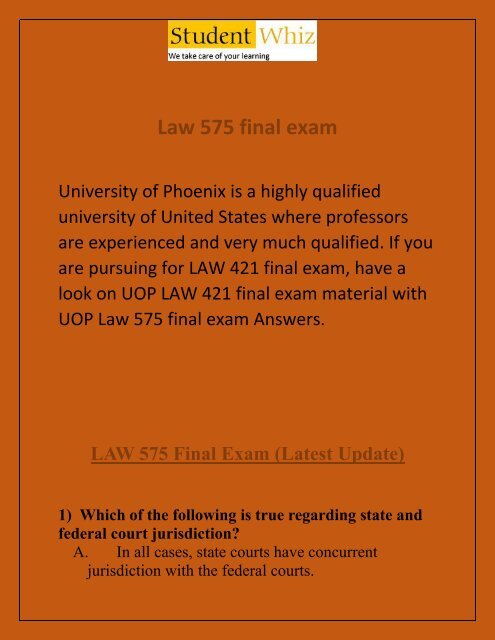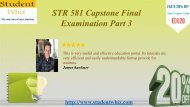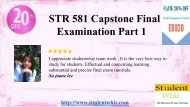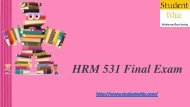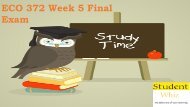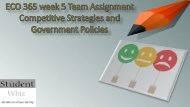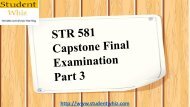LAW 575 Final Exam | LAW 575 Final Exam Questions and Answers | Studentwhiz.com
For scoring maximum marks in LAW 575 Final Exam, you need to improve regular studies into perfection. Exam guide of LAW 575 Final Exam will help you more for this task. Click here to download Complete Question and Answers of LAW 575 : http://www.studentwhiz.com/Online-Courses/LAW-575/1099/
For scoring maximum marks in LAW 575 Final Exam, you need to improve regular studies into perfection. Exam guide of LAW 575 Final Exam will help you more for this task. Click here to download Complete Question and Answers of LAW 575 : http://www.studentwhiz.com/Online-Courses/LAW-575/1099/
Create successful ePaper yourself
Turn your PDF publications into a flip-book with our unique Google optimized e-Paper software.
Law <strong>575</strong> final exam<br />
University of Phoenix is a highly qualified<br />
university of United States where professors<br />
are experienced <strong>and</strong> very much qualified. If you<br />
are pursuing for <strong>LAW</strong> 421 final exam, have a<br />
look on UOP <strong>LAW</strong> 421 final exam material with<br />
UOP Law <strong>575</strong> final exam <strong>Answers</strong>.<br />
<strong>LAW</strong> <strong>575</strong> <strong>Final</strong> <strong>Exam</strong> (Latest Update)<br />
1) Which of the following is true regarding state <strong>and</strong><br />
federal court jurisdiction?<br />
A. In all cases, state courts have concurrent<br />
jurisdiction with the federal courts.
B. Federal courts begin with exclusive jurisdiction<br />
until a state court intervenes.<br />
C. In all cases, state courts have exclusive<br />
jurisdiction unless the state's Supreme Court grants<br />
jurisdiction to a federal court in the state.<br />
D. In some cases, state courts have exclusive<br />
jurisdiction; in some cases, state courts have<br />
concurrent jurisdiction with the federal courts.<br />
2) Which of the following is true regarding a sole<br />
proprietorship?<br />
A. A sole proprietor shares control of the<br />
management of the business.<br />
B. The sole proprietor keeps a portion of the profits<br />
from the business.<br />
C. Profits are not taxed as the personal in<strong>com</strong>e of<br />
the sole proprietor.<br />
D. A sole proprietor is personally liable for<br />
obligations of the business.<br />
3) Which of the following is a type of ADR?<br />
A. Consultation<br />
B. Mediation<br />
C. Case argument
D. Case analysis<br />
4) Which of the following is an extension of<br />
negotiation?<br />
A. Arbitration<br />
B. Minitrials<br />
C. Neutral case evaluations<br />
D. Mediation<br />
5) Which of the following is an extension of<br />
negotiation?<br />
A. Arbitration<br />
B. Minitrials<br />
C. Neutral case evaluations<br />
D. Mediation<br />
6) Without obtaining advance permission, Annie<br />
places an unflattering photograph of the president of<br />
the college that she attends on folders that she is<br />
selling outside of class for extra money. Which of the<br />
following is true?<br />
A. Annie has <strong>com</strong>mitted defamation of the college<br />
president in the form of sl<strong>and</strong>er.
B. Annie has <strong>com</strong>mitted defamation of the college<br />
president in the form of libel.<br />
C. Annie has appropriated the photograph for<br />
<strong>com</strong>mercial gain, which constitutes an invasion of<br />
privacy.<br />
D. Annie has not <strong>com</strong>mitted any tort.<br />
7) ________ torts occur when the defendant takes an<br />
action that is inherently dangerous <strong>and</strong> cannot ever be<br />
undertaken safely, no matter what precautions the<br />
defendant takes.<br />
A. Liability<br />
B. Intentional<br />
C. Negligent<br />
D. Strict-liability<br />
8) The violation of a duty of care is called<br />
A. breach of responsibility<br />
B. breach of statute<br />
C. breach of duty<br />
D. objectionable breaching
9) Which of the following are <strong>com</strong>mon classifications<br />
of torts?<br />
A. Intentional, negligent, <strong>and</strong> criminal<br />
B. Intentional, criminal, <strong>and</strong> strict-liability<br />
C. Intentional, negligent, <strong>and</strong> strict-liability<br />
D. Criminal, negligent, <strong>and</strong> strict-liability<br />
10) Which of the following are <strong>com</strong>monly used<br />
theories of recovery in product liability cases?<br />
A. Negligence, negligence per se, <strong>and</strong> breach of<br />
warranty<br />
B. Strict product liability, negligence per se, <strong>and</strong><br />
breach of warranty<br />
C. Breach of warranty, negligence, <strong>and</strong> negligence<br />
per se<br />
D. Negligence, strict product liability, <strong>and</strong> breach of<br />
warranty<br />
11) The person who makes an offer is called an<br />
A. offeree<br />
B. offeror<br />
C. agreeor<br />
D. agent<br />
More details at: http://www.studentwhiz.<strong>com</strong>/Online-<br />
Education/<strong>LAW</strong>-<strong>575</strong>-<strong>Final</strong>-<strong>Exam</strong>-(Latest-Update)/4149/
Other courses<br />
<strong>LAW</strong> <strong>575</strong> <strong>Final</strong> <strong>Exam</strong><br />
LDR 300 <strong>Final</strong> <strong>Exam</strong><br />
FIN 370 <strong>Final</strong> <strong>Exam</strong><br />
BUS 475 Capstone <strong>Final</strong> <strong>Exam</strong>ination Part 2<br />
QNT 561 Weekly Learning Assessments<br />
STR 581 Capstone <strong>Final</strong> <strong>Exam</strong>ination, Part Three


